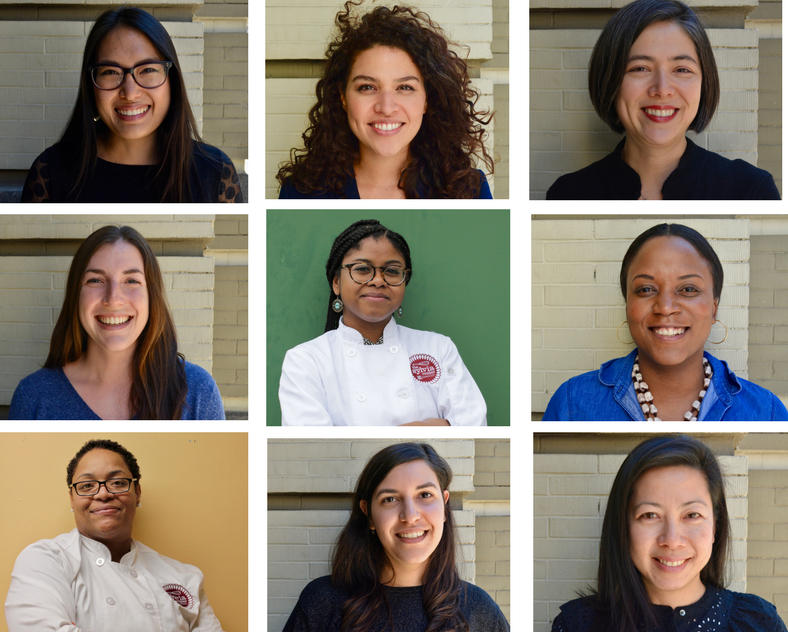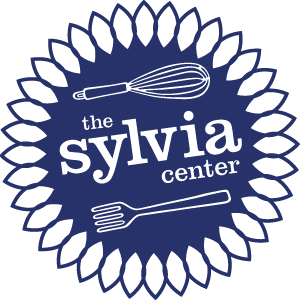
We are chefs, outdoor educators, and teachers who encourage youth to cook and eat what makes them feel good. In celebration of Women’s History Month, we are honoring the hard work of the women of The Sylvia Center by asking each of them a few questions about how to get inspired in the kitchen and what it means to be a woman leader in the culinary world.
Meet the women of The Sylvia Center, interviewed by Cindy Hu, Digital Communications Assistant:
Samantha Pagan, Director of Programs for The Sylvia Center in New York City
Jenn So, Director of Programs for The Sylvia Center at Katchkie Farm
Theresa Morelli, Senior Chef Instructor
Pat Marrett, Program Coordinator for The Sylvia Center in New York City
Rolanda Beckett, Chef Instructor
When did you decide to become a chef? What inspired you to cook?
SP: As I got older there were a few life events that really shaped my relationship around food and my health, and how they coincide with one another. I went on to study at Natural Gourmet Institute for Health and Culinary Arts and have worked in the health and culinary field since graduating in 2011. For me, it’s taking all I’ve learned about healthy cooking and healthy eating and sharing it with the participants in our classes with The Sylvia Center. I like to think the more fun you have around creating healthy dishes, the more likely you are to keep them in rotation in your own home.
JS: Teaching young people to cook instantly helps to build confidence. Youth feel a great sense of responsibility when you trust them to use a real chefs knife or to saute at the stove over an open flame. It always amazes me how quickly our students learn and I love seeing how proud they feel when someone trusts them with a serious task.
TM: As a kid, I was extremely picky! I lived on peanuts, raisins, and cinnamon toast. I did cook from scratch with my mom and grandmother growing up, but it was really in college when I decided a steady cafeteria diet wasn’t treating me very well. I started cooking healthier meals and inviting friends over to cook and eat together in my tiny campus apartment.
PM: It’s the fact of making that small change in someone’s life. Ten years ago, I would have never imagined myself either cooking and/or teaching. However, I knew I wanted to do something that creates some positive change. I am a purpose-driven person and I knew I wanted to do something that serves a purpose. In a wonderful and obvious sense, life has brought me here at The Sylvia Center and I am eternally grateful for the opportunity to be a part of a community that is working towards changing young people’s lives.
RB: I cooked for my church every week — 3 days a week, since 2010. I also worked in tech for 14 years, was a math teacher, a college prep and career development counselor. In 2014, I started cooking professionally and received a degree in Culinary Arts at Kingsborough Community College. I’ve always been cooking and making different dishes at home and when I worked at the restaurant, we would have cooking contests. I love being creative with food and sharing that with others.
What is your favorite ingredient to work with, or dish to make at home?
JS: My favorite thing to eat is dim sum. It’s communal, the meal can last for hours, sometimes with people leaving and new guests joining throughout the meal—it always feels so celebratory.
TM: Stir fry! I don’t know a vegetable that doesn’t taste good with the flavors of ginger and soy. It’s a great way to use up the produce sitting in your refrigerator, and it’s fast. You also don’t need any special equipment.
PM: I love baking…so every now and then, I try to whip up some fresh baked good. My absolute favorite thing to bake would be bread. It makes me calm and helps me practice patience.
RB: PORK. I am a growing fan of seafood except I eat the things that walk and not swim. I’ll eat octopus, lobster, crabs but will not eat clams, oysters…I am also exploring vegetarian dishes.
What do you want your students to take away from the class?
SP: Be kind to yourself and take the change step by step. You don’t need to turn your diet upside down overnight; start by identifying one habit you can change and work upward from there.
RB: Confidence and aspirations. Having confidence to do things and the capability to try new things.
How do you aim to make everyone feel included in a kitchen classroom?
JS: I like to ask students to taste the dish right before we serve it so that they have the final say in adjusting the flavors. It gives everyone more ownership over their own food.
PM: I have my students share in responsibilities and activities. Each week the students rotate through their shared kitchen responsibility where they take ownership but also find means of collaborating with each other to get their task done. I always encourage the overall class to taste each recipe(s) and have them talk about what they are tasting and how the recipe could be improved upon on. This is also my way of making each student feel like they have a role in the recipe’s outcome for the day.
RB: There are usually 10 kids in the class and to get them to focus, I’d make someone a leader. For example, I had this young man be the leader over the chili and another with the cornbread. Chili leader took charge and made sure everyone was doing something. He didn’t know I heard him, but after the chili was made, he went around asking everyone, “How’d you like the chili – you like the chili”? I thought that was so funny seeing that it was a very proud moment for him. You can see he was filled with confidence and was happy with what he and the other students made together.
What is a funny memory that has stuck with you while teaching the kids?
JS: During a Fresh Food Comes from the Farm program at Katchkie Farm, a first grader took a big whiff of the Butternut Squash Chili and shouted, “Smells like success!!”
PM: After our Soup and Sauce class, one of my students exclaimed, “Miss, I need to take you home so you can cook for me every day.” I told her, “Hey, but you made all of this and you all have the recipes to do this at home!” She was quick to respond, “Nope, I need you at home with me.” It was a funny request, and I took it as a compliment.
What keeps you personally motivated or makes you feel empowered?
PM: Cooking was the main thing that made me feel motivated and empowered. Unfortunately, I am not cooking as much right now and I really needed some activity to keep me centered and motivated, so I picked up Thai Boxing. It gives me a renewed sense of energy and it keeps me present and in certain ways keeps me centered
JS: Going for very long bike rides on beautiful, hilly routes in the Hudson Valley. I hate climbing hills, but I always feel so strong after doing a 20 mile bike ride that leaves my legs feeling like jelly.
Do you have a message for the girls, our future leaders? Any encouraging words on taking a risk? Being a woman in the culinary world?
PM: Being a girl is awesome. Being a woman is phenomenal. Embrace and celebrate what makes you different because that will be the thing(s) that will make you excel, succeed and shine. There will be hard moments but it’s through those tough moments that the best you will grow.
RB: Be confident in who you are and don’t’ let anyone tell you what you can or can’t do. People will tear you down and you will make mistakes, but you have to walk out of it with confidence.


